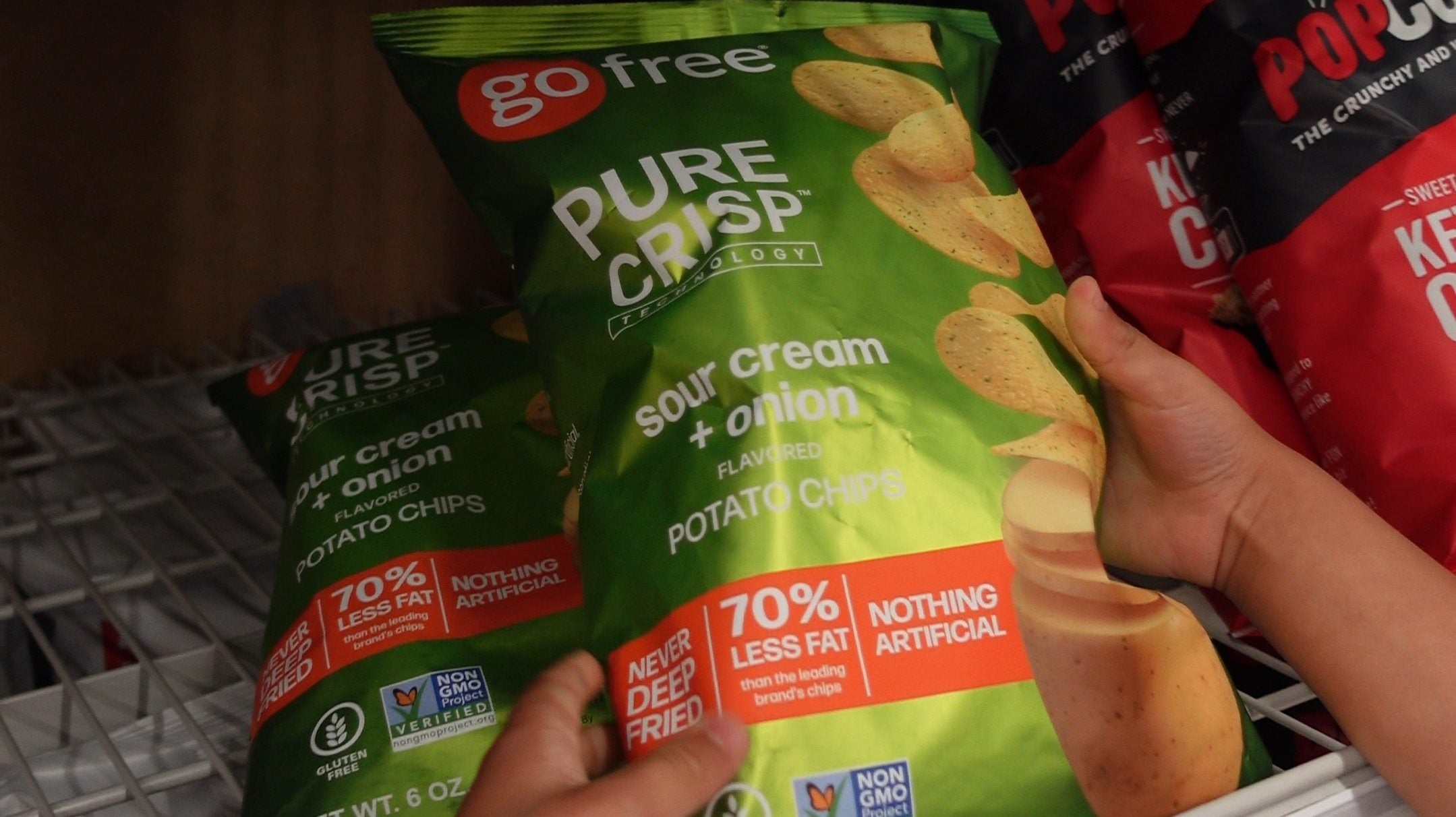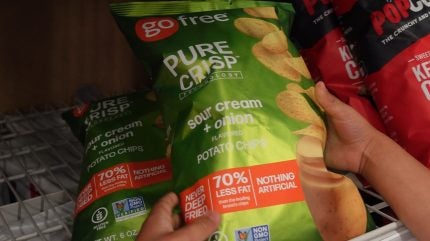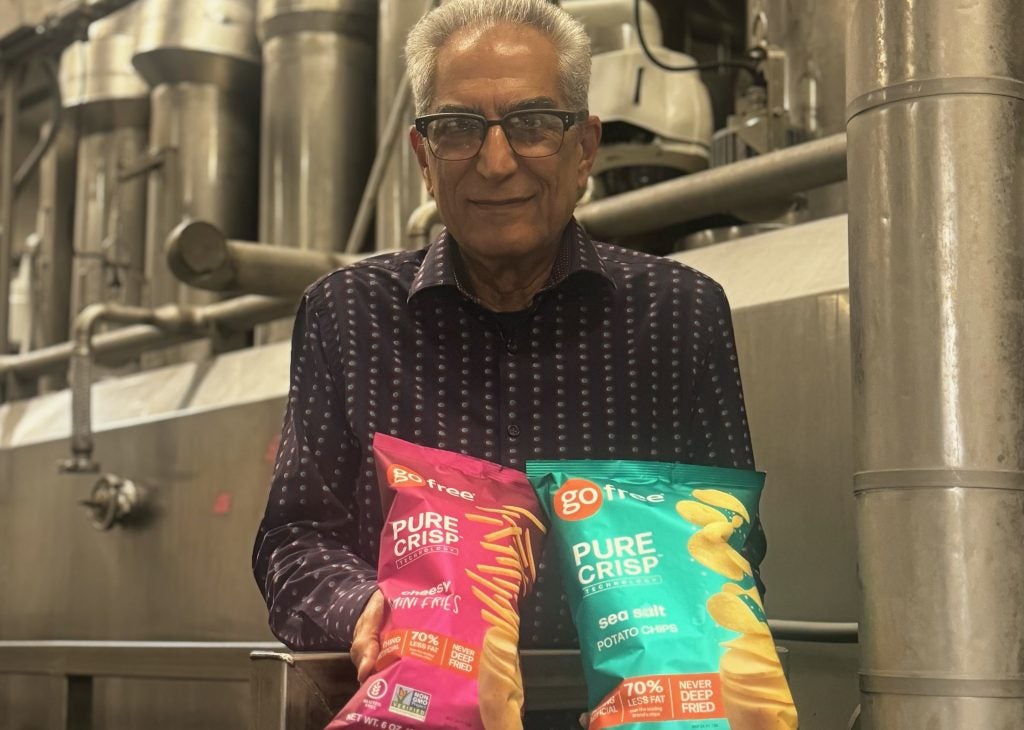

Food-industry veteran Jamshid Ashourian is looking to shake up the world of snacks.
Ashourian and his US-based company Jimmy Ash markets Go Free potato chips, snacks that contain 70% less fat “than the leading brand’s chips”.
The business, based in California, believes “deep frying is outdated, air frying incomplete” and, as well as looking to build GoFree’s distribution in the US, is open to teaming up with snack-food companies and using its recipes and processes to launch more products.
With sales of less than $5m, the company remains a small player in a huge market but, as Ashourian tells Just Food, it has big ambitions.
Dean Best (DB): The Jimmy Ash website describes the business as a “market disruptor”. What is the company looking to disrupt?
Jamshid Ashourian (JA): We are trying to disrupt the snack food and fried food industries. I’m committed to trying to make more wholesome, better, healthier foods and beverage products.
DB: When did the company launch its first product?
JA: Our first product hit the market, a test market, around 2017, 2018. We got into Wegmans on the East Coast. We only had one SKU, a sea salt product under the Go Free brand. The product goes beyond even air frying because we cook it with water and air. This whole concept of being a pure processing method led eventually to calling the technology Pure Crisp.
Access the most comprehensive Company Profiles
on the market, powered by GlobalData. Save hours of research. Gain competitive edge.

Company Profile – free
sample
Your download email will arrive shortly
We are confident about the
unique
quality of our Company Profiles. However, we want you to make the most
beneficial
decision for your business, so we offer a free sample that you can download by
submitting the below form
By GlobalData
DB: What explains the time between setting up the LLC and then launching the product?
JA: We were heavily engaged in product development, patent development, intellectual property development at the time. When I was trying to start this, I had a relationship with the food processing centre at the University of Nebraska where scientists and food engineers came together to help me with the idea. Many of them thought I was wasting my time, that it wasn’t going to happen. Larger companies had all spent hundreds of millions of dollars trying to achieve this. I explained my intention goes beyond just commercialisation and profits, although this is a business and we of course want to make it something that is very commercially viable.
There is also a heartfelt commitment that I have to make the world a better place. I’m committed and willing to work hard to make it happen – and that’s actually what happened because the scale of manufacturing turned out to be one of the bigger challenges that we had to overcome.
DB: How did you navigate the pandemic?
JA: The pandemic was a very, very difficult period for us as it was for everybody. Suddenly all of the grocery chains decided that they would not take any new products anymore, period. They basically shut down any new products. We had to overcome that and we focused on expanding the intellectual property, expanding product development and doing other things, getting into some smaller stores, like Central Market in Texas, which were willing to take us on. We focused on opportunities like that and, thank God, with the help of some investors, who I also have to express gratitude to, we made it through the pandemic.
We are now in just about over 400 Sprouts stores. We also remain at all of the Meijer stores. We’re in close to about 800 stores in total.
DB: Is that the peak for Go Free so far?
JA: Before the pandemic, I won’t mention the name of the chain just for respect but we did have a commitment to go to as many as about 1,400 stores with one chain. Then the pandemic hit and that was all just stopped.
DB: In the marketing of the Go Free snacks, what are the attributes of the product you emphasise?
JA: The product is not deep-fried, it has less fat and it does not contain any artificial flavours or ingredients. It is made up usually with only three ingredients: potato, oil and seasoning or salt.
DB: To what extent is the Go Free product recipe protected by patents?
JA: For now, we are pretty well protected by our patents. The patents are in 60 countries. We have new patents that we have filed even within the past month or so that will take our technologies to the next phase and add some additional products.
We are also in the process of [trying to] transform the French fry industry. French fries are partially deep-fried. We have succeeded in eliminating par-frying. The French fry industry also uses additives. We make French fries that are made of basically potato and oil only before they are deep-fried, baked or air-fried before consuming. That’s the new phase of our operations. We are in discussions right now with one of the largest French fry makers in the world. I don’t know where it would lead but at least they are interested in listening to us. We are in discussions to see whether we can lead this together.
I also want to add that, even though we have our own brand of snack foods, in all of the different [product] lines, if there is any company in the process of making potato chips or French fries, I welcome them to contact us. The more support and the more partners we can find globally we are fine with that. We’re not thinking it has to be just our own brand.
DB: Many companies have tried to launch healthier snacks and they haven’t worked. Isn’t it the case some consumers may just want an indulgent snack? They may be eating them less now as they become more aware of the links between diet and ill health but can a healthier version of a potato chip ever really succeed?
JA: There have been a lot of attempts made to try to create potato chips that are not deep-fried. I’m not trying to sell anything here, I’m just responding, but I don’t think anybody has been able to achieve what we have. That was the number one underlying reaction from consumers because they were not getting satisfaction from the products they were eating. The industry couldn’t create a potato chip from a fresh slice of potato that had the quality and satisfaction of a deep-fried piece of potato and many of them moved to making products made from dough or a mixture like you have with ‘baked’ products, so-called.
That was one aspect that is significantly different from what we do. We are willing to challenge anybody who wishes to try our products. We have made progress by leaps and bounds to be where we are. We are creating a product that is so real and so close to the real deep-fried product that I am 100% sure from the consumer feedback that we get that we will succeed.

DB: Given you’re interested in deals centred on your technology, are you in any discussions with any snack food companies?
JA: We’re not talking about the snack foods directly with anybody at this point. As I mentioned, we are talking with one of the largest French fry makers, who also has some interest in snack food and especially in the way we make it. Presently, 100% of our revenue comes from the Go Free brand.
We are in the process of expanding production and building larger facilities in the US and hopefully overseas. We will welcome the opportunity to do that anywhere and we are in the midst of right now considering and implementing that in the US. We are raising additional capital.
DB: Taking those points in turn: are you looking to invest in your existing facility in Bakersfield in California or are you looking to set up another site in the US?
JA: We are going to invest in the existing facility to expand its capacity but actually the facilities that we’re going to build will have significantly more production capacity than this one. This was our first production facility, in a way a combination of production and pilot plant but built as a smaller production facility.
In addition to our processes, our equipment, a drying system that we have is our own and is patented in over 30 countries. We built a production facility with those drying systems here in Bakersfield. Now we are ready to build facilities that would produce four or five thousand pounds of product per hour, anywhere in the world. Those are the kinds of facilities we will be building in the remainder of this year and the coming year. We have already considered a few other locations in the US. We are still in a search process.
DB: On funding, how much external funding have you raised so far?
JA: I have raised over $30m in external funding so far. We’re hoping we will raise both interim funds and an extensive amount of money for expansion in the remaining part of this year and next year.
The money that we have raised so far has come in the form of convertible promissory notes that have not been converted. It is subject to a discount at the time of conversion. All of the managers and directors of the company also have been recipients of incentive units in the company. Somewhere around 12-14% of the company has been granted in the form of incentive units to the management team. We have fewer than 15 [employees]. We use temporary labour quite a bit for production and at times we have as many as 25 people working with us as temporary employees.
DB: Beyond the Sprouts contract, do you have any further retail listings?
JA: We have not lined up any new listings yet but we are in discussion with a couple of groups that can distribute our products even beyond the existing capacity that we have. We are trying to expedite the expansion process.
DB: What do you anticipate your annual net sales will be in 2024?
JA: I would rather not share that for now but I can tell you that we will be probably under $5m still for this year.
DB: What plans do you have for the Go Free snacks brand outside the US?
JA: We’ve registered Go Free as a trademark in quite a few countries around the world. We envision that our expansion globally comes through one or two ways: we either build our own plants in some regions, or we’ll be happy to work with local snack food companies, French fry companies.

